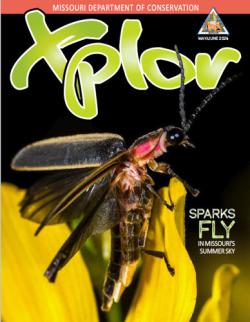
Xplor reconnects kids to nature and helps them find adventure in their own backyard. Free to residents of Missouri.


































Stay in Touch with MDC news, newsletters, events, and manage your subscription

Xplor reconnects kids to nature and helps them find adventure in their own backyard. Free to residents of Missouri.

A monthly publication about conservation in Missouri. Started in 1938, the printed magazine is free to residents of Missouri.


JEFFERSON CITY, Mo. – As blossoms and buds emerge each spring, so do Missouri's estimated 350 native black bears. As they leave their winter dens this time of year, finding food is their main focus. The Missouri Department of Conservation (MDC) reminds people to "Be Bear Aware" by not feeding bears and not providing potential sources of food.
“As black bears become active in the spring, they are on a mission to find food,” said Laura Conlee, a resource scientist and black-bear researcher with MDC. “It is very important for Missourians to recognize potential food attractants in their area. Things such as bird feeders, trash, barbeque grills, and food waste left out at camp sites can all serve as huge attractions for bears. Keeping our areas free of attractants, and letting bears find natural foods is in everyone’s best interest. If you see a bear, enjoy the sighting, let the bear be, and be sure you don’t offer it any food. Most importantly, never intentionally feed them.”
Conlee added feeding bears makes them comfortable around people, which can also make them dangerous.
"When bears lose their fear of people, they may approach people in search of food or may defend the food sources or territory they associate with people, which can make them dangerous," Conlee said. "When this happens, the bear has to be destroyed. A fed bear is a dead bear."
She added a fed bear that becomes a problem in one place cannot be relocated to another.
“Once a bear learns that people can provide food, they will seek out other places such as camp sites, residential areas, and farms in search of food,” she explained. “Bears also have an excellent memory and will often return year after year to places where they were provided food.”
MDC offers these tips for avoiding attracting black bears to possible food sources:
While close encounters are uncommon, MDC offers this advice when outdoors in black-bear country:
A native to Missouri, black bears were abundant until the late 1800s when they were nearly wiped out from unregulated killing and from habitat loss when Ozark forests were logged. MDC research shows that a small number of native black bears survived. Over time, their numbers increased and continue to do so. Results of ongoing black-bear research by MDC staff and others show that the animals have been sighted in about half the counties in Missouri, primarily south of the Missouri River, with most bears located in the southern third of the state in the Missouri Ozarks.
Black bears are a protected species in Missouri. MDC anticipates a limited hunting season as a population-management method once black bear numbers reach a population estimate of about 500 animals. The current estimate is about 350. No details regarding the anticipated future hunting season have been developed.
MDC asks people to report bear sightings online at mdc.mo.gov/ReportBears. The online reporting helps MDC staff get more complete information and those reporting sightings can include photos.
For more information on black bears in Missouri and how to Be Bear Aware, visit the MDC website at mdc.mo.gov/bearaware